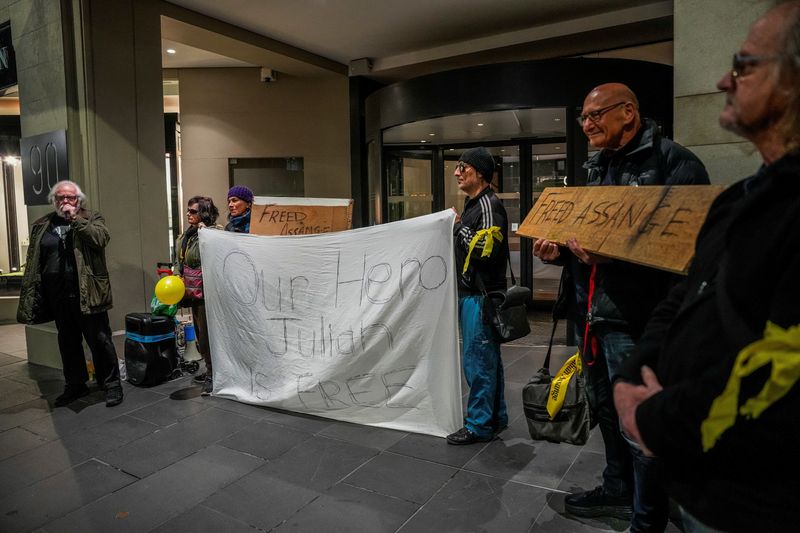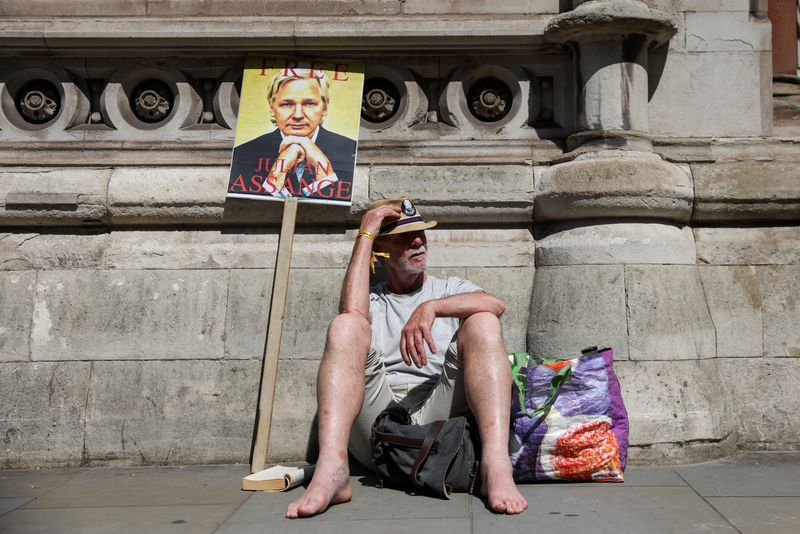By Kanishka Singh and Kate Holton
WASHINGTON/LONDON (Reuters) -Free-speech organizations welcomed the news of Wikileaks founder Julian Assange's release from jail in Britain but said the U.S. case had still set a bad precedent for journalism.
Assange is due to plead guilty on Wednesday to one charge of violating U.S. espionage law, in a deal that will allow him to return home to Australia, ending a 14-year legal odyssey that could have landed him in jail in the United States for decades.
U.S. authorities in 2019 charged Assange on 18 criminal counts of conspiring with former U.S. Army intelligence analyst Chelsea Manning to obtain classified information and unlawfully publishing the names of classified sources.
He has been in prison in Britain for the last five years where he has been fighting extradition to the United States.
Several rights groups, leading media organizations and the leaders of countries including Mexico, Brazil and Australia had urged that the charges against Assange be dropped.
His wife Stella, who was initially a lawyer on his campaign team, said she was elated by the news, but that striking a deal to win his freedom still posed a serious concern for journalists, especially those working on national security issues.
That concern was echoed by Wikileaks editor-in-chief Kristinn Hrafnsson.
"I'm pretty sure they (journalists) already have been hesitant to enter into certain fields like covering national security issues when the United States is involved, because the signalling has already been 'stay out of our business, we don't care if you maintain it's in the public interest, we will come after you'."
Alan Rusbridger, a former editor of Britain's Guardian newspaper, one of the global titles that worked with WikiLeaks to publish some of the leaked material, said it was "pretty disturbing" that espionage laws were being used to target those who revealed uncomfortable information for states.
"I'm sorry that it's taken a plea on a charge of espionage because I don't think actually anybody thinks that what he was doing was espionage," Rusbridger told Reuters.
"But he's been in jail for long enough. I hope that's the end of his punishment for what he did."
Rusbridger said Assange was the first to pioneer "this new breed of semi-activist, semi-publisher, semi-journalist who use the internet to tremendous effect" and he was sure the intention by the U.S. was to deter others from pursuing national security stories.
"If the attempt was to chill national-security reporting, I fear it's probably worked," he said.
Assange's supporters say he is a hero who was victimized because he exposed U.S. wrongdoing and alleged war crimes, including in conflicts in Afghanistan and Iraq. Washington says the release of documents he helped publish endangered lives.
Jameel Jaffer, executive director of the free-speech organization Knight First Amendment Institute, said the deal meant Assange would have served "five years in prison for activities that journalists engage in every day".
"It will cast a long shadow over the most important kinds of journalism, not just in (the U.S.) but around the world," Jaffer said in an emailed statement.

The Committee to Protect Journalists said the prosecution had grave implications for journalists and press freedom worldwide.
"While we welcome the end of his detention, the U.S.’s pursuit of Assange has set a harmful legal precedent by opening the way for journalists to be tried under the Espionage Act if they receive classified material from whistleblowers. This should never have been the case," CPJ CEO Jodie Ginsberg said.
